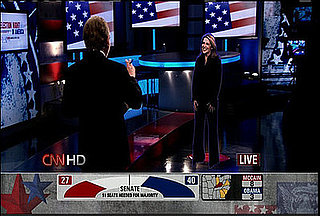
Former Vice President Al Gore onstage at the Web 2.0 Summit.
(Credit: Dan Farber/CNET News)
SAN FRANCISCO–The central theme of former Vice President Al Gore’s speech, concluding the Web 2.0 Summit on Friday afternoon, was electricity.
He spoke of “the electrifying redemption of America’s revolutionary declaration that all human beings are created equal,” as emphasized through Barack Obama’s election victory on Tuesday, and how it “would not have been possible without the additional empowerment of individuals to use knowledge as a source of power that has come with the Internet.”
Gore reiterated what so many people have said before–that the Obama campaign was a vindication for how the new tools of the Internet can be used toward legitimate change.
“What happened in the election opens up a full new range of possibilities, and now is the time to really move swiftly to use these new possibilities,” he said. “I made a talk earlier today about how the early uses of electricity 100 years ago were aimed at sort of specialized applications and gimmicks and do-dads and whiz-bangs that demonstrated the special qualities of this new conveyor of power.”
He meant, essentially, throwing an electric sheep. (Apologies to Philip K. Dick.)
“Now we just take electricity for granted as everywhere, and it has empowered a whole civilization,” he said. Gore said the analogy stands for Web 2.0 as well. “When people are displaying interactivity or user-generated content or social networking, that’s kind of the gee-whiz stuff…We need to move past that.”
Electricity, too, is key to Gore’s urgent call to action, which he detailed with an immediacy that was needed at a conference where some panels drifted a little too far into the speculative future. America needs a “unified national smart grid” distributing renewable solar energy across the country, something he estimates would cost $400 billion in a decade. But it would create thousands of jobs, Gore said, and it would pay for itself within three years.
When Obama takes office in January, Gore said the new president ought to set “a national goal of getting 100 percent of America’s electricity from renewable and noncarbon sources within 10 years. We can do that.”
He continued: “The declaration from President Kennedy that we would land a man on the moon and bring him back safely was thought by many to be impossible.”
Gore had come onstage at the conference to a standing ovation and so much applause that he had to tell the audience to quiet down. His story is familiar: he famously won the popular vote for the presidency in 2000 but lost the electoral vote to George W. Bush, and he went on to win both an Academy Award for his environmental-awareness documentary An Inconvenient Truth and the Nobel Peace Prize last year.
In 2005, Gore founded Current TV, a cable news network that he created with Joel Hyatt in response to his dissatisfaction with the television industry. “One of the main reasons why our political system has not been operating very well until this election is the deadening influence of the television medium as it has been operated,” he said.
Gore encouraged the digerati in the audience to keep pushing forward as they face what he says is the most pressing struggle of our time, climate change–the subject matter of An Inconvenient Truth. The fact that the Web’s candidate of choice won this time is no reason to rest easy, he said. Media democratization needs to continue evolving.
“Just as Barack Obama’s election would’ve been impossible without the new dialogue and new ways of interacting–the Web–the only way (climate change) is going to be solved is by addressing the democracy crisis, and the country hit a great blow for victory this week, but we have to take this issue and raise it in the awareness of everyone,” Gore said. “I think that it is very much in its infancy, barely beginning, and I think that we are not many years away from television sort of sinking into the digital world and becoming a part of it.”
Cynics might say Gore, who calls himself a “recovering politician,” is still bitter at a sterilized news media that didn’t sufficiently back his calling in the 2000 presidential election. Needless to say, his views remain controversial. But onstage, Gore seemed plenty comfortable in his new role as a thought leader rather than an elected official.
“Who knew that you were the guru of Web 2.0, as well as global warming?” conference organizer Tim O’Reilly asked Gore jokingly after the former vice president had illustrated an analogy involving “crowdsourced” information and cloud computing, two of the decade’s most buzzworthy digital talking points.
If the audience was any indication, Gore has gained resounding acceptance as an information-age guru, a bit of an irony, considering that 10 years ago, erroneous reports circulated that he had once claimed to have invented the Internet.
“When we have really had these great leaps forward has been when new information ecoystems have made it possible for individuals who are thinking and processing information, and who have aspirations and hopes…to connect easily with lots of voters around core ideas,” Gore explained. His preferred analogy was the invention of the printing press five centuries ago, in which he connected general historical events to the rise of literacy and eventually the creation of democratic governments.
“The installation of a new sovereign, the rule of reason, and the emergence of a marketplace of ideas that was accessible to individuals–that really empowered this kind of collective intelligence,” Gore said. “And the American constitution could be, by analogy, a brilliant piece of software that regularly harvested the results of that.”
An audience member asked Gore how much he thought governments should regulate Internet use, and Gore fired back, “As little as possible.” There was more applause, and as he left the stage, there was yet another standing ovation.
Gore might not have invented the Internet (or even claimed to do so). But if the Web 2.0 Summit was any indication, plenty of Silicon Valley’s most loyal are more than happy to have him help reinvent it.









